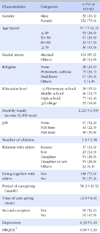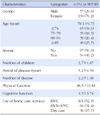Abstract
Purpose
The purpose of this study was to identify the factors associated with the health-related quality of life of family caregivers.
Methods
A cross-sectional study was conducted. This study included 191 primary family caregivers of elders who used home care services (home-visit nursing, home-visit care, daycare) covered by the public long-term care insurance. Data were collected using self-report questionnaires from December 2010 to June 2011. These data were analyzed by using hierarchical multiple regression.
Results
The majority of the family caregivers were female (79.6%) and daughters-in-law (28.8%). The mean depression score was 6.33±6.49 and the mean health-related quality of life score was 0.69±0.39. It was found that the factors affecting the health-related quality of life of family caregivers included depression (β=-.406, p<.001), home-visit nursing use (β=.296, p<.001), and daycare use (β=.178, p=.015), which accounted for 36.6% of their health-related quality of life.
Conclusion
Using home-visit nursing and daycare services has a positive effect on the health-related quality of life of family caregivers. To improve health-related quality of life of family caregivers, South Korea needs to fully activate the home-visit nursing and daycare services, and to strengthen family support programs.
Figures and Tables
References
1. Borgaonkar MR, Irvine EJ. Quality of life measurement in gastrointestinal and liver disorders. Gut. 2000. 47:444–454.
2. Burgener S, Twigg P. Relationships among caregiver factors and quality of life in care recipients with irreversible dementia. Alzheimer Dis Assoc Disord. 2002. 16:88–102.

3. Calvert M, Freemantle N. Use of health-related quality of life in prescribing research. Part 1. Why Evaluate Health-Related Quality of Life? J Clin Pharm Ther. 2003. 28:513–521.

4. Chen Y, Lu J, Wong KS, Mok VC, Ungvari GS, Tang WK. Health-related quality of life in the family caregivers of stroke survivors. Int J Rehabil Res. 2010. 33:232–237.
5. Gaugler JE, Jarrott SE, Zarit SH, Stephens MA, Townsend A, Greene R. Adult day service use and reductions in caregiving hours: Effects on stress and psychological well-being for dementia caregivers. Int J Geriatr Psychiatry. 2003. 18:55–62.
6. Jönsson AC, Lindgren I, Hallstrom B, Norrving B, Lindgren A. Determinants of quality of life in strokesurvivors and their informal caregivers. Stroke. 2005. 36:803–808.
7. Joo KB, Kim KB. A study of care burden, burnout, and quality of life among family caregivers for the elderly. Korean J Women Health Nurs. 2008. 14:278–289.
8. Kang EJ, Kim NY, Park MH, Lee NH. The third national health and examination survey (KNHANES III), 2005 Activity limitation and health-related quality of life. 2006. Seoul: Ministry of Health and Welfare & Institute for Health and Social Affairs.
9. Kim DB, Park SY, Kim SB. The influence of using of long-term care service on depression and life satisfaction among family care-givers: A comparison of leisure activity. J Fam Relat. 2010. 15:117–135.
10. Kim JS, Kim MS, Kim SO, Yoo YJ, Won DY. Factors influencing dementia caregivers' health-related quality of life. J Korean Acad Community Health Nurs. 2007. 18:232–241.
11. Kim KS, Lee SW, Choe MA, Yi MS, Kim EJ. Effects of biofeedback exercise training in hemiplegic patients after stroke. J Korean Acad Nurs. 2001. 31:432–442.
12. Kim MH, Cho YS, Uhm WS, Kim SH, Bae SC. Cross-cultural adaptation and validation of the Korean version of the EQ-5D in patients with rheumatic diseases. Qual Life Res. 2005. 14:1401–1406.
13. Kim SY, Kim JS, Youn HS. Predictors of depression and life satisfaction among family caregivers for demented elderly. J Korea Gerontol Soc. 2004. 24:111–128.
14. Lee YK. Determinants of long-term care service use by elderly. J Korean Gerontol Soc. 2009. 29:917–933.
15. Lim KH, Park YN, Kim DH, Shin IH, Lee WS, Kim JB. A preliminary study of the standardization of the Korean version of the patient health questionnaire-9. Korean J Health Promot. 2009. 9:275–281.
16. Martinez-Martin P, Arroyo S, Rojo-Abuin JM, Rodriguez-Blazquez C, Frades B, de Pedro Cuesta J. Burden, perceived health status, and mood among caregivers of parkinson's disease patients. Movement Disorders. 2008. 23:1673–1680.
17. Ministry of Health and Welfare & National Health Insurance Corporation. The collection of long-term care insurance law. 2008. Seoul: Author.
18. Miura H, Arai Y, Yamasaki K. Feeling of burden and health-related quality of life among family caregivers looking after the impaired elderly. Psychiatry Clin Neurosci. 2005. 59:551–555.
19. Nam HS, Kim KY, Kwon SS, Ko KW, Kind P, Yang HK, et al. EQ-5D Korean valuation study using time trade off method. 2007. Daejeon: Chungnam National University.
20. National Health Insurance Corporation. 2010 Long term care insurance statistical yearbook. 2011. Seoul: Author.

21. Rabin R, de Charro F. EQ-5D: A measure of health status from the EuroQol Group. Ann Med. 2001. 33:337–343.

22. Saunders MM. Working and caregiving: A comparison of employed and unemployed caregivers of older heart failure patients. Holist Nurs Pract. 2010. 24:16–22.

23. Schulz R, Beach ST. Caregiving as a risk factor for mortality: Caregiver health effects study. JAMA. 1999. 282:2215–2219.

24. Song MS, Kim MS, Gu MO, Kim SM, Kim JH, Kim HS, et al. Measurement in gerontology research. 2007. Seoul: Koonja.

25. Spitzer RL, Williams JB, Kroenke K, Hornyak R, McMurray J. Validity and utility of the PRIME-MD patient health questionnaire in assessment of 3000 obstetric-gynecologic patients: The PRIME-MD patient health questionnaire obstetrics-gynecology study. Am J Obstet Gynecol. 2000. 183:759–769.

26. Välimäki TH, Vehvilainen-Julkunen KM, Pietila AM, Pirttila TA. Caregiver depression is associated with a low sense of coherence and health-related quality of life. Aging Ment Health. 2009. 13:799–807.
27. Warren S, Kerr JR, Smith D, Godkin D, Schalm C. The impact of adult day programs on family caregivers of elderly relatives. J Community Health Nurs. 2003. 20:209–221.
28. Yoo MS, Kim YS, Kim KS. A Study about health related quality of life, burden and coping ability for family caregivers caring for dementia elderly. J Korean Gerontol Soc. 2010. 30:1117–1127.
29. Yun JH, Kang JM, Kim KS, Kim SH, Kim TH, Park YW, et al. Health-related quality of life in Korean patients with chronic diseases. J Korean Rheum Assoc. 2004. 11:263–274.




 PDF
PDF ePub
ePub Citation
Citation Print
Print






 XML Download
XML Download